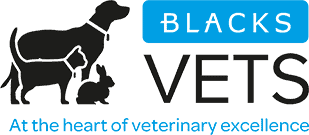May is Veterinary Nursing Awareness Month, a whole month dedicated to raising awareness of the veterinary nursing profession and the vital role they play in animal care and treatment.
Helen is one of our dedicated Senior Veterinary Nurses here at Blacks Vets and she kindly took time out to tell us about life as a vet nurse.
How long have you been a Vet Nurse and what route did you follow to qualify?
I've been in practice for over 20 years. I joined Black & Partners in November 1999, only a few months after sitting my A-Levels and as a complete newbie to the industry.
I started college in September 2000 at India House in Birmingham (one day a week) where I undertook anatomy and physiology which were by far my most favourite subjects. In year two I moved my training to Rodbaston College in Stafford where I completed the remainder of my training (radiography, surgical nursing, anaesthesia, laboratory etc).
I qualified at the end of 2002, gaining my Level 3 Diploma in Veterinary Nursing. This employed route allowed me to receive an income whilst also attending college one-day-a-week for two years. I found this time invaluable, as working in practice alongside going to college, meant I could apply the knowledge I was building, to the practical tasks I was helping with every day.
What attracted you to a career as a Veterinary Nurse?
Growing up, my life was centred around animals and I had a keen interest in nursing and helping, so it just seemed like a natural progression.
What does your job as a senior veterinary nurse entail?
- Admitting and preparing animals for surgery
- Monitoring anaesthesia through to patients in recovery
- Nursing sick animals and administering medications prescribed by the veterinary surgeon
- Radiography
- Taking blood samples and placing intravenous catheter
- Preparing and running laboratory samples and laboratory
- Advising owners on the health and welfare of their pets
- Booking appointments, taking payments and completing paperwork
- Pharmacy management and stock control
- Champion for the RCVS Practice Standards Scheme and ensuring compliance with their guidelines
- To ensure the maintenance and good work order of surgical equipment.
What is the most rewarding thing about being a Vet Nurse?
Making a positive change to the health and well-being of an animal.
What kind of attributes do you need to be a good Vet Nurse?
You must have compassion and be hard-working. This is not a 9-5 job. The hours are long and anti-social, and the caseload can be physically and emotionally very demanding. You need to be confident to be able to work well in a team and also alone at times. Common sense and a willingness to learn and expand your knowledge are essential, as medicine is constantly evolving.
What advice would you give someone thinking about a career as a Vet Nurse?
Although this profession can bring with it work-life sacrifices, it is also very rewarding. It won't make you a millionaire, but you will feel a sense of accomplishment and satisfaction knowing you've had a big positive impact on an animal’s life at their time of greatest need.
What are the best things about working at Blacks Vets practice?
The animals of course! Oh, and the diversity, no two days are ever the same!
I work with a wonderful team of people and together we pull each other through the tough times, and we bask in the joys of the good times.
What would be your career highlight so far?
Using my knowledge and experience for the rehabilitation of foster animals that I have taken into my home. Seeing them improve medically and emotionally to either remain with us or progress to their forever homes is so rewarding.
Have you completed any additional training to support you in your role?
Apart from regular Professional Development (CPD), I haven't received any additional training. I just picked up the roles I have, applied some common sense, researched what needed to be done and just got on with it.
What's the next step in your career pathway?
I have progressed my way to become a Senior Veterinary Nurse and an advocate for the RCVS Practice Standards within my practice. For me, this, along with the fostering of animals which cross my path, are currently enough for me.
My passions are within anaesthesia and pharmacy and my role allows me to spend time within these fields of veterinary nursing.
Thank you, Helen, for sharing your story.
To find out more about the role of RVNs in veterinary practice, or if you are interested in finding out more about a career in veterinary nursing, visit the BVNA website at www.bvna.org.uk/a-career-in-veterinary-nursing/a-career-in-veterinary-nursing.


